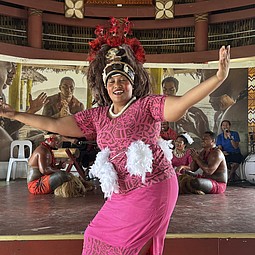Gifting the Future
December 20, 2013 at 6:00 a.m.
Glen Holland spent decades supporting his family, teaching high school music, and looking forward to finding time to work on the symphony he dreamed of composing. Time passed swiftly, and unanticipated obligations continuously interfered with his carefully laid plans to compose. It wasn't until the day of his retirement that he came to see it wasn't the symphony that was his life's work after all; his family, his students, and the many lives he touched in positive ways throughout the journey were his true opus.
Mr. Holland's Opus, a movie release in 1995, was a beautiful reflection of an important truth. Contributing to the well-being of others is a noble - and, according to recent studies, very necessary - choice in life. Tara L. Gruenewald, Ph.D., researcher and assistant professor of gerontology at the University of Southern California in Los Angeles, has made studying the act of giving to others - and its effects on how we age - her own life's work.
Gruenewald presented the results of her latest study at the 66th Annual Scientific Meeting of the Gerontological Society of America in New Orleans last month. She found that more favorable perceptions of generativity were correlated with better aging outcomes. In this and several previous studies, Gruenewald and associates found that people who make a habit of contributing to others show lower rates of physical disability and loss of mobility, and in fact, live longer, than those who don't feel they'd made a useful contribution.
Simply put, generativity is the state of having concern for others and the future, and the effort of making a conscious contribution to the greater good. Those who strive to make such a contribution seem to enjoy better mental and physical health as they age.
The checks you write to your preferred charity and the time and services you volunteer to causes in which you believe are certainly valuable contributions to the greater good. But don't underestimate the power of more casual forms of giving - the random acts of kindness we commit every day, often without even knowing it. Smiling at a stranger who seems to be having a difficult day; holding the door for a fellow shopper; pausing to let a motorist make a difficult turn; offering a kind word to a harried mother; these small but meaningful gestures can change the course of another person's day for the better. Accumulated, that's a lot of joy spread around over the years.
"It is one of the most beautiful compensations in life," wrote Ralph Waldo Emerson, "that no man can help another without helping himself." Gruenewald shared the reference at the end of her presentation, stating that it seems to reflect the consistent findings from her research. The act of giving makes us feel useful. Feeling useful triggers physiological processes that improve our health. Giving, therefore, seems to be an integral part of successful aging.
When you stop to think about it, you've been giving all your life. Perhaps this did not occur in ways you would consider strictly philanthropic, but then again, giving takes numerous forms. We gave nurturance and support to the children we raised, and those children grew into adults who will likewise give to the next generation. We gave of ourselves to our careers, mastering our crafts and mentoring younger workers who went on to become the masters who mentored the young. We took part in civic, religious, and social organizations, investing our time and effort into the future of the group and the well-being of its members. We contributed to others and to the future in countless ways, most of them - as in the case of Mr. Holland - simply through the act of living.
The map of our lives changes as we age, but our impact on the world around us doesn't diminish. The days of raising children may be far behind us, for example, but we continue to nurture and guide grandchildren and even great-grandchildren. Retirement marks the formal end of one career, but the majority of retirees today go on to pursue encore careers or to invest themselves in efforts that have meaning far beyond a salary. And even as we slow down and choose to be more selective about where our time and energy go, we still have the power to interact in generative ways with neighbors, friends, and others who pass through our days.
A key element in generativity, according to John Kotre, Ph.D., a professor emeritus of psychology at the University of Michigan, and author of Outliving the Self: How We Live on in Future Generations, is both receiving from the past and giving to the future. In the process of that transmittal, we first must look at the past - at our choices and actions during the journey that brought us to the present moment - and find meaning that we didn't see through the eyes of our younger self.
Generativity is actually a stage in human psychological development, according to Erik Erikson, the psychologist who introduced the term in 1950. From mid-life to the beginning of the retirement years, we find purpose in that which we create and contribute. And this is especially important as we pass into the final stage of development in later adulthood, where our primary task is deciding whether the life we lived had meaning. To know one has made a difference leads to integrity, Erickson said; to harbor only regrets leads to despair.
But Gruenewald's research suggests that these stages are not immutable. Her subjects were questioned about their feelings of usefulness in the present, not the past. Those who were satisfied with the person they chose to be at that point in time - regardless of their past - enjoyed better health and more successful aging. These findings suggest that even if we have some regrets about the past, it is never too late to re-navigate and choose a more meaningful destination.
How can we apply this academic and philosophical knowledge to daily life in ways that will benefit us?
Become a historian. Gather stories from your family's past and compile them into a narrative, complete with your own observations. With today's technology, anyone can create a keepsake document for the family. You might even consider self-publishing a volume to hand down. The hidden gift to you in creating this gift for others is the perspective you will achieve and the meaning you will discover when looking back.
Get involved. Chances are, you're already volunteering time to your church, senior center, or other local group. You can capitalize on your gifts by sharing them in new ways. If you love to cook, offer your services at a soup kitchen. Book lovers can help children or non-native English speakers to read better through community literacy programs. Those who love working with tools can volunteer through Habitat for Humanity.
To find the right venue for you, try websites like VolunteerMatch.org, Idealist.org, or Volunteers.AARP.org. Or do it yourself by entering your field of interest with the word "volunteer" in your favorite search engine. The possibilities, as you will discover, are substantial.
Share your gifts. Each day presents opportunities to share your unique skills and perspective in informal ways. Are you a gardener? Offer to teach an interested neighbor about working the earth, using your own flowerbed as the classroom. Befriend a young mother and give her a brief respite by inviting her child over for cookies and a story. Prepare and deliver a meal to a friend who is under the weather, or offer transportation to someone who can't get around as well as they used to. An hour or two of your time is all it takes to make a difference in someone's life.
Remember the opus. Mr. Holland's opus wasn't the musical composition he longed to write. It was the many acts of kindness offered to the people around him that was his true life's work - and that, added up over the course of years, made a difference. Remember that a kind word, a smile, a moment spent focused on the needs of the other, create a work that, in the end, is far greater than the sum of its parts.
Dawn Williams is a 2013 MetLife Journalist in Aging fellow. This article was prepared in part based on material provided during the Gerontological Society of America's Annual Scientific Meeting.





